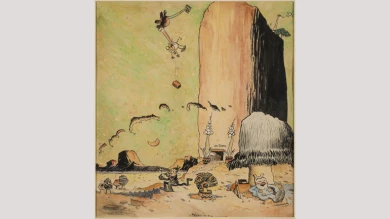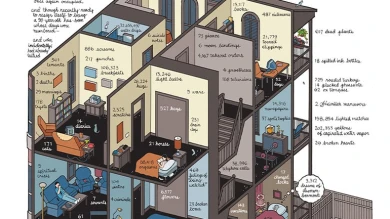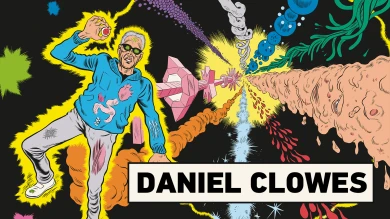-
Tuesday, 10 October 2023 Nouvel Building, Protocol Room
Conversation with Chris Ware
— Participant: Elisa McCausland
Tickets -
Wednesday, 11 October 2023 Nouvel Building, Auditorium 400
Encounter with Chris Ware
— Participants: Carla Berrocal, Enrique Bordes and Raquel Jimeno
Tickets
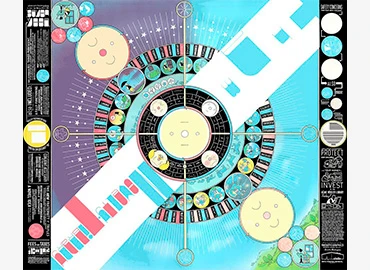
Chris Ware, ACME Novelty Library, 2022 © Chris Ware
Held on 10, 11 Oct 2023
The Documents programme explores the relationships between art and publishing, examining themes that include the effects of archive on narratives of art history, the artist’s book and publishing as an artistic practice. This instalment centres on the work of draughtsman and cartoonist Chris Ware (Omaha, Nebraska, 1967), one of the pre-eminent names in independent comics. Ware will also take part in a conversation with Elisa McCausland and encounter with Carla Berrocal, Enrique Bordes and Raquel Jimeno.
The comic can be regarded as a form of visual writing which, in contrast to prose, gives rise to associations and forms of reminiscence through the conjunction of text and image. Using this quality, Ware explores the borders between the real and the imagined, untethering the full potential of a perfected and virtuoso drawing to shape an architectural world inhabited by profoundly melancholy beings. Such examples are the orphan Jimmy Corrigan, the lonely Rusty Brown or the sad mouse Quimby, a version of Ignatz the mouse, a character by his much-admired George Herriman, one of the pioneers of the medium alongside Winsor McCay, or more recently Charles Schulz, both of whom Ware also cites and pays homage to. Despite their predicaments of failure and marginalisation, these characters continue to dream of other lives, a strain between the realism and escapism characterising the universe and personal history of the comics the artist creates. A further hallmark of his practice are his graphic novels straddling book and artefact, and his design of every aspect, from the typeface to the binding, from the overall storyline to the complex world in each vignette. Moreover, he explores and expands the creative possibilities of the book as an object, as in Building Stories (Pantheon Graphic Novels, 2012), a collection in box format which contains fourteen different types of printed works — newspapers, magazines, folded boards, pamphlets and leaflets — in no particular order and can thus be read depending on the connections each reader wishes to make.
At once a brilliant inventor and methodical artisan of books, Ware has connected with the origins of the comic book, putting forward powerful narrative revisions, and showing us, in a celebration of reading, narration and the page, how the comic strip and drawn stories, even in the digital age, are among the most fascinating artistic practices of our time.
Organised by
Museo Reina Sofía, Centro José Guerrero (Granada City Council) and La Madraza. Centro de Cultura Contemporánea (University of Granada)
Programme
Collaboration
illycaffèParticipants
Chris Ware is a cartoonist. His graphic art, which draws inspiration from American artists from the beginning and middle of the twentieth century, and experiments with the language of the medium are a reference point for scores of cartoonists and illustrators worldwide. His graphic novel Jimmy Corrigan: The Smartest Kid on Earth (2000) won the Guardian First Book Award (UK, 2001) and the Angoulême International Comics Festival Prize for Best Album (Angoulême, France, 2003), while Building Stories received the Eisner Award in 2013. His work has also been displayed in museums such as the Whitney Museum of American Art (New York, 2002), the Museum of Contemporary Art (Chicago, 2006) and Centre Georges Pompidou (Paris, 2022). His practice extends beyond the sphere of the cartoon strip, encompassing illustration and graphic design, as shown by his different covers for The New Yorker or his design of George Herriman’s series Krazy & Ignatz for the publishing house Fantagraphics (2019–2023).
Carla Berrocal is an illustrator and cartoonist. Notable among her publications are Epigrafías (Libros del Autoengaño, 2017), La geometría de los silencios: Relatos reales de vidas imaginarias (CEPE, 2019) and Doña Concha. La rosa y la espina (Reservoir Books, 2021). For the third project mentioned she received a MAEC-AECID Comic Book Grant from the Spanish Academy in Rome. Furthermore, she has curated, with Elisa McCausland, the exhibition Presentes: autoras de tebeo de ayer y hoy (Colectivo de Autoras de Cómic and AECID, 2016), which has toured different institutions.
Enrique Bordes is an architect and researcher specialised in graphic art and comics. His work encompasses different spheres such as the comic strip, architecture, museography and photography. Since 2003, he has combined his professional work with university lecturing and, in 2015, was awarded a grant from the Royal Academy of Spain in Rome, in the Design section. He is the author of the publication Cómic, arquitectura narrativa (Cátedra, 2017).
Raquel Jimeno is an activity coordinator at the Museo Reina Sofía.
Elisa McCausland (1983) is a journalist, critic and researcher specialised in comics. She is a regular contributor to Radio 3, Dirigido por, El Salto and Sofilm, and her most notable publications include Wonder Woman. El feminismo como superpoder (Errata Naturae, 2017) and, with Diego Salgado, Supernovas. Una historia de la ciencia ficción audiovisual (Errata Naturae, 2019) and Sueños y Fábulas. Historia de Vertigo (Ecc Ediciones, 2022). Furthermore, she has curated the exhibition Presentes: Autoras de tebeo de ayer y hoy (Rome, 2016), and promoted Colectivo de Autoras de Cómic (The Collective of Women Comics Artists) and is a member of the ECC-UAH Chair of Comic Research and Culture.

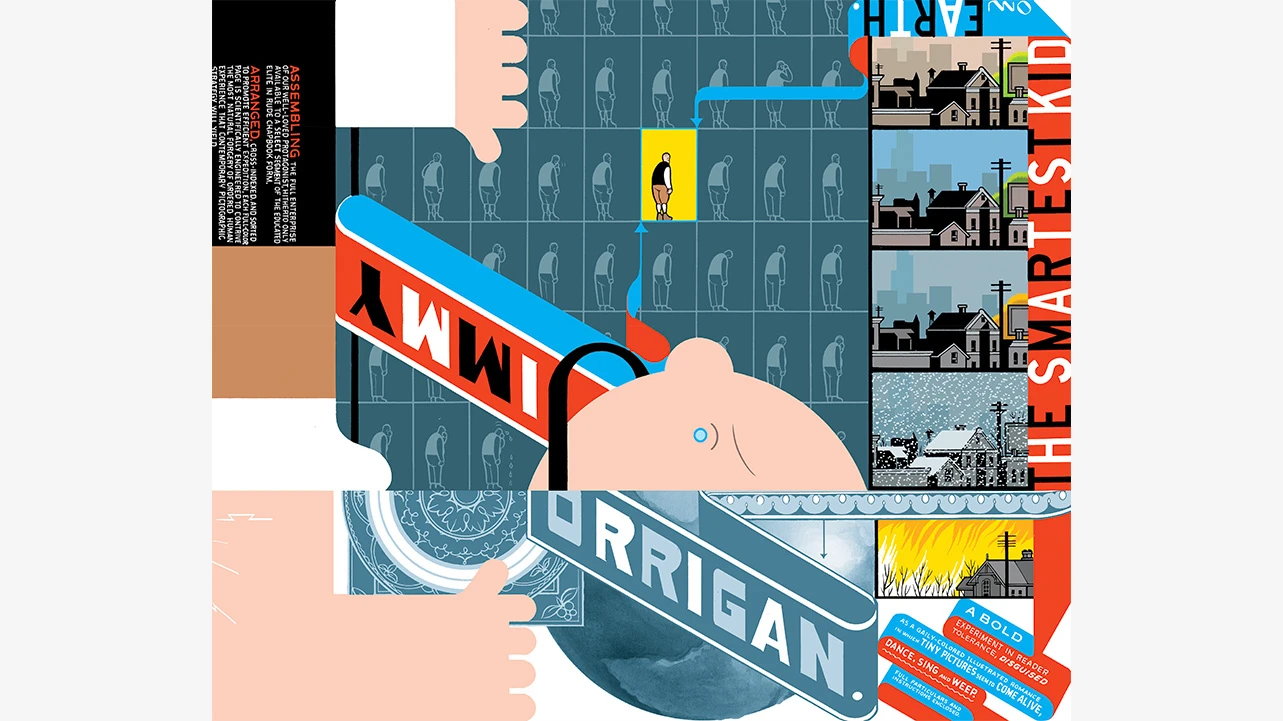

Más actividades
![Tracey Rose, The Black Sun Black Star and Moon [La luna estrella negro y negro sol], 2014.](https://recursos.museoreinasofia.es/styles/small_landscape/public/Obra/AD07091_2.jpg.webp)
On Black Study: Towards a Black Poethics of Contamination
Monday 27, Tuesday 28 and Wednesday 29 of April, 2026 – 16:00 h
The seminar On Black Study: Towards a Black Poethics of Contamination proposes Black Study as a critical and methodological practice that has emerged in and against racial capitalism, colonial modernity and institutional capture. Framed through what the invited researcher and practitioner Ishy Pryce-Parchment terms a Black poethics of contamination, the seminar considers what it might mean to think Blackness (and therefore Black Study) as contagious, diffuse and spreadable matter. To do so, it enacts a constellation of diasporic methodologies and black aesthetic practices that harbor “contamination” -ideas that travel through texts, geographies, bodies and histories- as a method and as a condition.
If Blackness enters Western modernity from the position of the Middle Passage and its afterlives, it also names a condition from which alternative modes of being, knowing and relating are continually forged. From within this errant boundarylessness, Black creative-intellectual practice unfolds as what might be called a history of touches: transmissions, residues and socialities that unsettle the fantasy of pure or self-contained knowledge.
Situated within Black radical aesthetics, Black feminist theory and diasporic poetics, the seminar traces a genealogy of Black Study not as an object of analysis but as methodological propositions that continue to shape contemporary aesthetic and political life. Against mastery as the horizon of study, the group shifts attention from what we know to how we know. It foregrounds creative Black methodological practices—fahima ife’s anindex (via Fred Moten), Katherine McKittrick’s expansive use of the footnote, citation as relational and loving labour, the aesthetics of Black miscellanea, and Christina Sharpe’s practices of annotation—as procedures that disorganise dominant regimes of knowledge. In this sense, Black Study is approached not as a discrete academic field but as a feel for knowing and knowledge: a constellation of insurgent practices—reading, gathering, listening, annotating, refusing, world-making—that operate both within and beyond the university.
The study sessions propose to experiment with form in order to embrace how ‘black people have always used interdisciplinary methodologies to explain, explore, and story the world.’ Through engagements with thinkers and practitioners such as Katherine McKittrick, C.L.R. James, Sylvia Wynter, Christina Sharpe, Fred Moten, Tina Campt, Hilton Als, John Akomfrah, fahima ife and Dionne Brand, we ask: What might it mean to study together, incompletely and without recourse to individuation? How might aesthetic practice function as a poethical intervention in the ongoing work of what Sylvia Wynter calls the practice of doing humanness?

Intergenerationality
Thursday, 9 April 2026 – 5:30pm
This series is organised by equipoMotor, a group of teenagers, young people and older people who have participated in the Museo Reina Sofía’s previous community education projects, and is structured around four themed blocks that pivot on the monstrous.
The third session gazes at film as a place from which to dismantle the idea of one sole history and one sole time. From a decolonial and queer perspective, it explores films which break the straight line of past-present-future, which mix memories, slow progress and leave space for rhythms which customarily make no room for official accounts. Here the images open cracks through which bodies, voices and affects appear, disrupting archive and questioning who narrates, and from where and for whom. The proposal is at once simple and ambitious: use film to imagine other modes of remembering, belonging and projecting futures we have not yet been able to live.

Remedios Zafra
Thursday March 19, 2026 - 19:00 h
The José Luis Brea Chair, dedicated to reflecting on the image and the epistemology of visuality in contemporary culture, opens its program with an inaugural lecture by essayist and thinker Remedios Zafra.
“That the contemporary antifeminist upsurge is constructed as an anti-intellectual drive is no coincidence; the two feed into one another. To advance a reactionary discourse that defends inequality, it is necessary to challenge gender studies and gender-equality policies, but also to devalue the very foundations of knowledge in which these have been most intensely developed over recent decades—while also undermining their institutional support: universities, art and research centers, and academic culture.
Feminism has been deeply linked to the affirmation of the most committed humanist thought. Periods of enlightenment and moments of transition toward more just social forms—sustained by education—have been when feminist demands have emerged most strongly. Awareness and achievements in equality increase when education plays a leading social role; thus, devaluing intellectual work also contributes to harming feminism, and vice versa, insofar as the bond between knowledge and feminism is not only conceptual and historical, but also intimate and political.
Today, antifeminism is used globally as the symbolic adhesive of far-right movements, in parallel with the devaluation of forms of knowledge emerging from the university and from science—mistreated by hoaxes and disinformation on social networks and through the spectacularization of life mediated by screens. These are consequences bound up with the primacy of a scopic value that for some time has been denigrating thought and positioning what is most seen as what is most valuable within the normalized mediation of technology. This inertia coexists with techno-libertarian proclamations that reactivate a patriarchy that uses the resentment of many men as a seductive and cohesive force to preserve and inflame privileges in the new world as techno-scenario.
This lecture will address this epochal context, delving into the synchronicity of these upsurges through an additional parallel between forms of patriarchal domination and techno-labor domination. A parallel in which feminism and intellectual work are both being harmed, while also sending signals that in both lie emancipatory responses to today’s reactionary turns and the neutralization of critique. This consonance would also speak to how the perverse patriarchal basis that turns women into sustainers of their own subordination finds its equivalent in the encouraged self-exploitation of cultural workers; in the legitimation of affective capital and symbolic capital as sufficient forms of payment; in the blurring of boundaries between life and work and in domestic isolation; or in the pressure to please and comply as an extended patriarchal form—today linked to the feigned enthusiasm of precarious workers, but also to technological adulation. In response to possible resistance and intellectual action, patriarchy has associated feminists with a future foretold as unhappy for them, equating “thought and consciousness” with unhappiness—where these have in fact been (and continue to be) levers of autonomy and emancipation.”
— Remedios Zafra

ARCO2045. The Future, for Now
Saturday 7, March 2026 - 9:30pm
The future, its unstable and subjective nature, and its possible scenarios are the conceptual focus of ARCOmadrid 2026. A vision of the future linked to recent memory, a flash of insight into a double-edged sword. This year's edition, as in the previous two, will once again hold its closing party at the Reina Sofia Museum. This time, the star of the show is Carles Congost (Olot, Girona, 1970), one of the artists featured in the new presentation of the Collections recently inaugurated on the 4th floor of the Sabatini Building.
Carles Congost, with his ironic and timeless gaze, is responsible for setting the tone for this imperfect future, with a DJ session accompanied by some of his works in the Cloister on the first floor of the Sabatini Building of the Museo on the night of Saturday 7 March.

27th Contemporary Art Conservation Conference
Wednesday, 4, and Thursday, 5 March 2026
The 27th Contemporary Art Conservation Conference, organised by the Museo Reina Sofía’s Department of Conservation and Restoration, with the sponsorship of the Mapfre Foundation, is held on 4 and 5 March 2026. This international encounter sets out to share and debate experience and research, open new channels of study and reflect on conservation and the professional practice of restorers.
This edition will be held with in-person and online attendance formats, occurring simultaneously, via twenty-minute interventions followed by a five-minute Q&A.
